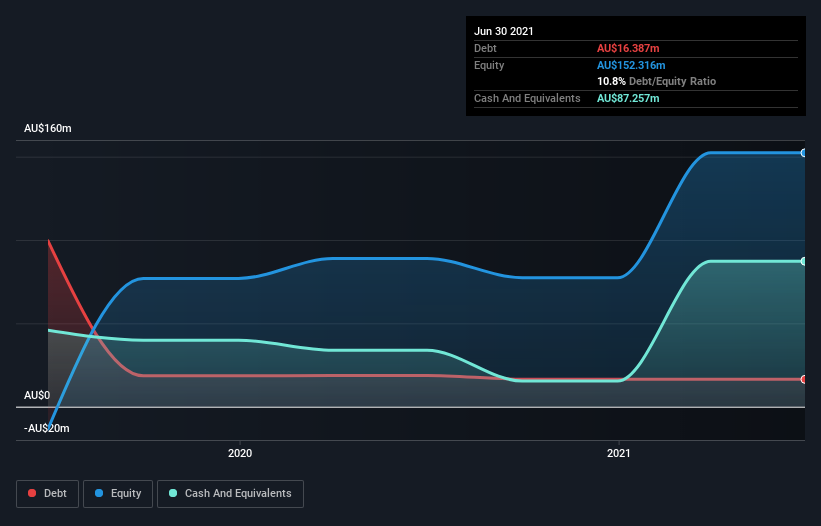Is Carbon Revolution (ASX:CBR) A Risky Investment?
David Iben put it well when he said, 'Volatility is not a risk we care about. What we care about is avoiding the permanent loss of capital.' When we think about how risky a company is, we always like to look at its use of debt, since debt overload can lead to ruin. We note that Carbon Revolution Limited (ASX:CBR) does have debt on its balance sheet. But should shareholders be worried about its use of debt?
When Is Debt Dangerous?
Debt and other liabilities become risky for a business when it cannot easily fulfill those obligations, either with free cash flow or by raising capital at an attractive price. Part and parcel of capitalism is the process of 'creative destruction' where failed businesses are mercilessly liquidated by their bankers. However, a more frequent (but still costly) occurrence is where a company must issue shares at bargain-basement prices, permanently diluting shareholders, just to shore up its balance sheet. Of course, debt can be an important tool in businesses, particularly capital heavy businesses. The first step when considering a company's debt levels is to consider its cash and debt together.
Check out our latest analysis for Carbon Revolution
How Much Debt Does Carbon Revolution Carry?
The image below, which you can click on for greater detail, shows that Carbon Revolution had debt of AU$16.4m at the end of June 2021, a reduction from AU$18.7m over a year. But it also has AU$87.3m in cash to offset that, meaning it has AU$70.9m net cash.
How Strong Is Carbon Revolution's Balance Sheet?
The latest balance sheet data shows that Carbon Revolution had liabilities of AU$27.2m due within a year, and liabilities of AU$19.7m falling due after that. On the other hand, it had cash of AU$87.3m and AU$12.2m worth of receivables due within a year. So it actually has AU$52.4m more liquid assets than total liabilities.
This excess liquidity suggests that Carbon Revolution is taking a careful approach to debt. Because it has plenty of assets, it is unlikely to have trouble with its lenders. Simply put, the fact that Carbon Revolution has more cash than debt is arguably a good indication that it can manage its debt safely. There's no doubt that we learn most about debt from the balance sheet. But ultimately the future profitability of the business will decide if Carbon Revolution can strengthen its balance sheet over time. So if you want to see what the professionals think, you might find this free report on analyst profit forecasts to be interesting.
In the last year Carbon Revolution had a loss before interest and tax, and actually shrunk its revenue by 10%, to AU$35m. That's not what we would hope to see.
So How Risky Is Carbon Revolution?
Statistically speaking companies that lose money are riskier than those that make money. And we do note that Carbon Revolution had an earnings before interest and tax (EBIT) loss, over the last year. Indeed, in that time it burnt through AU$33m of cash and made a loss of AU$32m. Given it only has net cash of AU$70.9m, the company may need to raise more capital if it doesn't reach break-even soon. Even though its balance sheet seems sufficiently liquid, debt always makes us a little nervous if a company doesn't produce free cash flow regularly. The balance sheet is clearly the area to focus on when you are analysing debt. However, not all investment risk resides within the balance sheet - far from it. Be aware that Carbon Revolution is showing 2 warning signs in our investment analysis , you should know about...
At the end of the day, it's often better to focus on companies that are free from net debt. You can access our special list of such companies (all with a track record of profit growth). It's free.
This article by Simply Wall St is general in nature. We provide commentary based on historical data and analyst forecasts only using an unbiased methodology and our articles are not intended to be financial advice. It does not constitute a recommendation to buy or sell any stock, and does not take account of your objectives, or your financial situation. We aim to bring you long-term focused analysis driven by fundamental data. Note that our analysis may not factor in the latest price-sensitive company announcements or qualitative material. Simply Wall St has no position in any stocks mentioned.
Have feedback on this article? Concerned about the content? Get in touch with us directly. Alternatively, email editorial-team (at) simplywallst.com.

